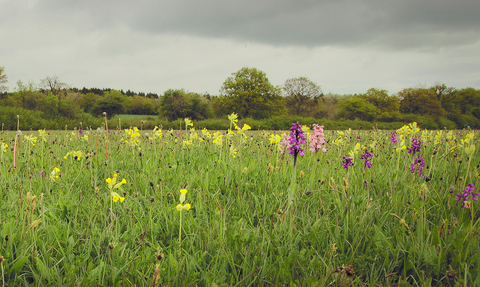
Orchids and cowslips at Bernwood Meadows by Rhea Draguisky
Donate to the Ox-Cam Expressway legal challenge
The government’s choice of corridor to house a new expressway between Oxford and Cambridge could have devastating impacts on wildlife. We believe the way this corridor has been chosen is illegal.
In mid-January the High Court refused permission for our claim against the government. We appealed, and won permission for a judicial review in mid-February. Our judicial review hearing took place on 19-20 June 2019. We are awaiting a verdict.
In November 2018, we launched a fundraising appeal to help cover our legal costs. We are immensely grateful to everyone who donated - thank you for helping us stand up for wildlife, and give a voice to those who have none.
Our fundraising appeal for the Expressway legal challenge is now closed, but if you would like to donate to BBOWT's work protecting and speaking up for wildlife, you can do so below.
The expressway will facilitate 1 million new homes, which represents a near doubling of the number of houses, schools, hospitals and businesses in the region and is the equivalent of a city the size of Birmingham.
Alarmingly, Highways England has failed to commission a Strategic Environmental Assessment, which we argue is required under European law for plans and programmes of this size due to the significant impacts they can have on the environment. This means the true impact has not properly been considered and the public has been denied the opportunity to fully scrutinise the comparative economic, societal and environmental impacts of the options through a public consultation.
Our wildlife and green spaces have never been under such incredible pressure. We believe that our counties need spaces for wildlife that can be enjoyed by all. Thank you to everyone who donated to our appeal. Your generosity helped us give wildlife a voice.
FAQs
See below for frequently asked questions about our Oxford to Cambridge fundraising appeal. You can find out more about the Expressway and our response to it here.
What happens if you do not raise all of the money?
If we do not raise all of the necessary funds by the end of December we would ask our Trustees to make funds available from our reserves to cover any shortfall - which means that while we would still pursue this legal challenge, we would have less money to spend on managing our existing nature reserves in the years to come.
Is this your role as a charity to challenge government?
After our 50 page response to the Closed Consultation by Highways England was ignored, the next logical step was to initiate a judicial review process. A judicial review can be initiated by anyone, including members of the public. Our decision to begin judicial review proceedings is not a political decision; it is a challenge to the process by which a decision was made by the government.
As the only charity in our area concerned with all aspects of nature conservation, we believe it is our obligation to do our best to protect wildlife and the environment. As a membership organisation, we must act in the interests of our members. The way in which the government put forward their proposal for the Oxford to Cambridge Expressway directly threatens wildlife, both on our nature reserves and in the wider countryside. We believe this is against the interests of our members.
What happens if your case is not successful?
The current proposal for the Expressway will have unacceptable impacts on the wildlife in our nature reserves and in the wider countryside. If our case is not successful, we will continue to lobby the government to insist that they modify the proposals for the Oxford to Cambridge Expressway so that they have the minimum possible impact on the wildlife on our nature reserves and in the wider countryside.
Can you explain how the judicial review process works?
A judicial review is a type of court proceeding in which a judge reviews the lawfulness of a decision or action made by a public body. They are a challenge to the way in which a decision has been made, rather than a challenge to the outcomes of a decision. You can read more about the definition of a judicial review here, and a more detailed explanation of the process here.
What is an SEA?
SEA stands for 'Strategic Environmental Assessment'. The UNECE Protocol on Strategic Environmental Assessment (the Protocol on SEA) establishes clear and transparent procedures for integrating environmental and health considerations into national development plans, programmes and legislation in such potentially polluting economic sectors as agriculture, energy, industry, transport, regional development, land use, waste management or water management. The members of the EU ratified the SEA Protocol in 2008.
Watch a short introduction to the Protocol on Strategic Environmental Assessments:
